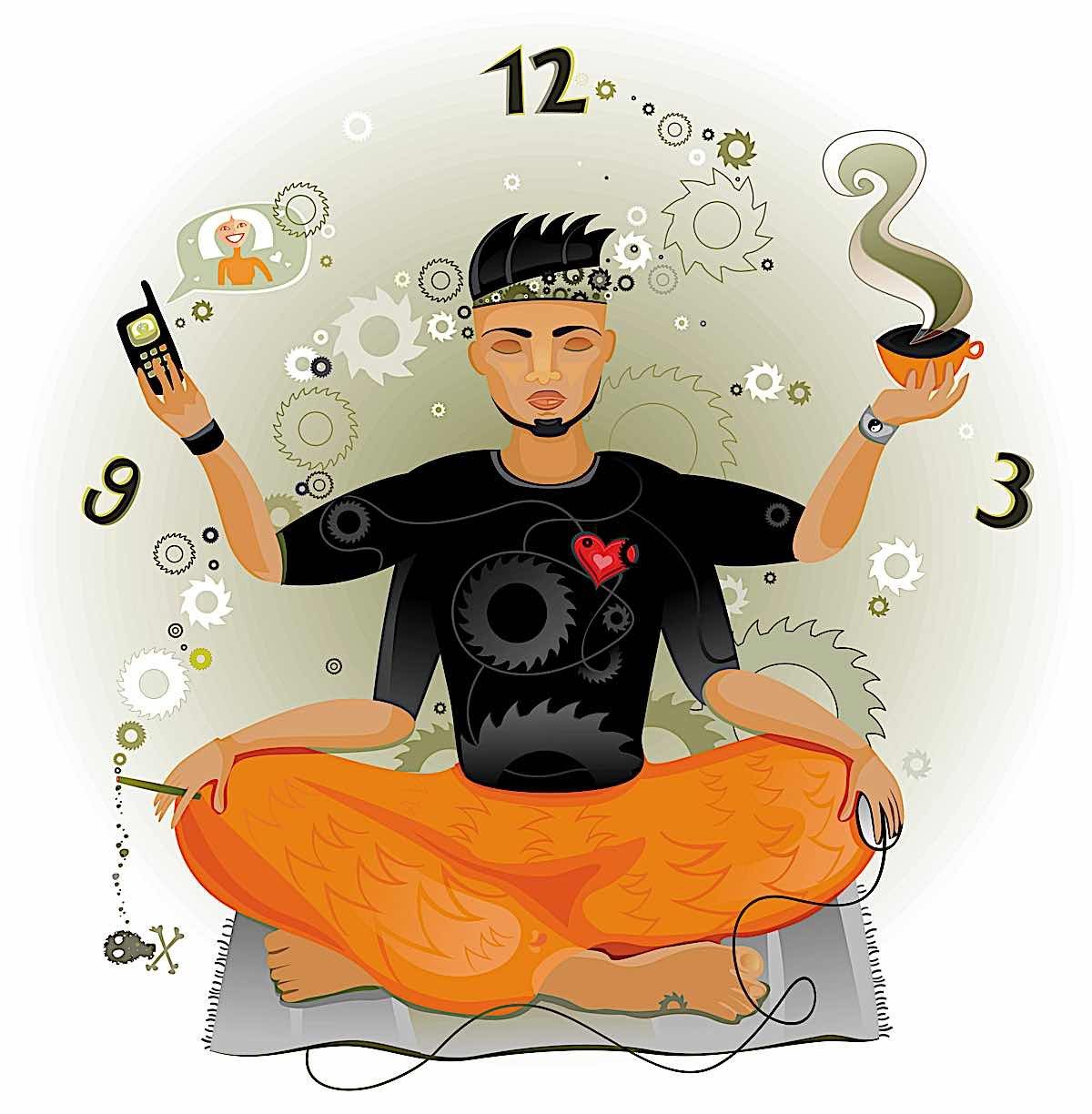Why it can be a struggle to practice meditation regularly — and tips for overcoming the obstacles
You’ve probably heard about the many benefits of meditation, which drives many people to set the intention to meditate. But intending and doing are two different things.
Meditation is almost always a struggle when you’re first developing your practice.
So if you’re struggling to meditate, know that you’re not alone.
And you might be able to relate to the following reasons why it can be a struggle to practice meditation regularly.
By Trevor McDonald

It feels unnatural
Unless you grew up practicing meditation, you’re probably not used to quieting your mind. Instead, we become accustomed to following thought after thought – from the time we wake up until the time we shut our eyes at night.
And when you meditate, it can feel unnatural to prevent yourself from doing this. You think about one thing, and then another related thought comes up. And then another. And then another. Before you know it, you’re in deep thought, and it seems like meditation is impossible. Fortunately, that’s not true. And what you’re feeling is actually part of the process.
Later in this post, we’re going to cover a few things you’ll need to know to make it through this early phase, so be sure to read to the end.

You struggle to find time
If you’re like most people, one of the biggest obstacles standing in the way of meditation is time. But you should understand that, in most cases, this is an illusion.
And if you think you don’t have time to meditate, you may have bought into a common misconception about meditation.
Meditation does not have to be time-consuming or difficult – and you can do it virtually anywhere at any time. (1)
If you can carve out five minutes every day, you can start your practice. It doesn’t have to be at the same time every day. Just find five minutes of quiet time when thinking isn’t mandatory.

You beat yourself up for your thoughts
Most new meditators go through a period of frustration where they almost always claim to be “bad at meditating.” And then, they give up.
But here’s the thing — this feeling is born of a misunderstanding. You see, when you meditate, you don’t have to stop thinking. That would be impossible.
Instead, think of your thoughts like waves. You can’t stop a wave from coming, but you might be able to stop yourself from getting carried away with it.
When thoughts enter your mind, let them go as easily as they came.
Here’s an example:
While you’re meditating, you realize you have no idea what you’re having for dinner.
This isn’t a bad thing. It’s not a meditation fail.
Simply let that thought fade away.
If you choose to follow that thought instead, you might start thinking about recipes, what you have in the fridge and how much time you have. Next, you’re thinking about rescheduling things or taking shortcuts home, so you have enough time to make the recipe you’ve chosen.

Can you see the difference?
One represents meditation, and the other represents our normal patterns of thought.
When people say that meditation is about clearing your mind, it doesn’t mean wiping down to a squeaky clean slate. It simply means reducing the clutter.
Tips for getting through the struggle
If you’re finding it difficult to meditate, try taking some of the weight off of your shoulders.
There’s no pressure, and it’s definitely not a competition. The more you practice, the better you’ll get. And even still, there will be days that feel better than others. It’s okay.
Think of meditating like exercise for your mind. You may feel incredibly strong and capable one day and weak and fatigued the next. This is to be expected, but it’s still better to workout than to sit on the couch.

So here are a few tips that may help you get through the struggle.
- Try binaural beats – Binaural beats therapy (2) is a form of sound therapy where the right and the left ear listen to beats at a slightly different frequency yet perceive the tone as one. Binaural beats therapy may stimulate the brain in a similar way to meditation, so this therapy may take some of the pressure off while you can still get many benefits.
- Accept wherever you are – Some people transition naturally to meditation while others struggle. This could have to do with genetics, mental and emotional wellbeing, or even your physical state. For example, meditation is often recommended for those with anxiety disorder (3) or if your recovering from a traumatic injury, such as a brain injury (4). While you may find it more difficult to meditate, the benefits are still worthwhile. Accept where you are and avoid comparing your journey to anyone else’s.
- Attempt a routine – Having a routine may help you remain consistent with your practice. And for most people, the best time to meditate is first thing in the morning. It’s true that you can meditate anywhere at any time, but you’re more likely to stick to the practice when it’s part of your daily routine.
There’s a reason they call meditation a practice. Whether you’ve been meditating for three days or three years, you can strengthen your mind and improve your practice.
But still, it should never feel like a struggle. Follow the tips in this post to help alleviate some of the anxiety you may have over meditated.
HELPFUL LINKS FOR MORE INFORMATION
1. How to Meditate Anywhere (Even While Waiting in Line)
2. What are binaural beats and how do they work?
3. The Ultimate Guide to Dealing With Anxiety
4. The Ultimate Guide To Brain Injuries
More articles by this author
Search
Latest Features
Please support the "Spread the Dharma" mission as one of our heroic Dharma Supporting Members, or with a one-time donation.
Please Help Support the “Spread the Dharma” Mission!

Be a part of the noble mission as a supporting member or a patron, or a volunteer contributor of content.
The power of Dharma to help sentient beings, in part, lies in ensuring access to Buddha’s precious Dharma — the mission of Buddha Weekly. We can’t do it without you!
A non-profit association since 2007, Buddha Weekly published many feature articles, videos, and, podcasts. Please consider supporting the mission to preserve and “Spread the Dharma." Your support as either a patron or a supporting member helps defray the high costs of producing quality Dharma content. Thank you! Learn more here, or become one of our super karma heroes on Patreon.
Trevor McDonald | Author
Author | Buddha Weekly
Trevor McDonald is a freelance writer, avid yogi and writes extensively about recovery from alcoholism and drug addiction. He has been in recovery and sober for over five years. Since his recovery began, he has enjoyed using his talent for words to help spread treatment resources, addiction awareness and general health knowledge.















